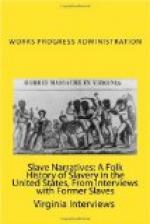“Well the horn would blow every morning for you to git up and go right to work; when the sun ris’ if you were not in the field working, you would be whipped with whips and leather strops. I ’member Aunt Beaty was beat until she could hardly get along but I can’ ’member what for but do you know she had to work along till she got better. My ma had to work pretty hard but my oldest sister, Judy, was too young to work much.
“A heap of de slaves would run away and hide in de woods to keep from working so hard but the white folks to keep them from running away so that they could not ketch ’em would put a chain around the neck which would hang down the back and be fastened on to another ’round the waist and another ’round the feet so they could not run, still they had to work and sleep in ’em, too; sometimes they would wear these chains for three or four months.
“When a slave would die they had wooden boxes to put ’em in and dug holes and just put then in. A slave might go to a sister or brother’s funeral.
“My recollection is very bad and so much is forgotten, but I have seen slaves sold in droves like cows; they called ’em ‘ruffigees,’ and white men wuz drivin’ ’em like hogs and cows for sale. Mothers and fathers were sold and parted from their chillun; they wuz sold to white people in diffunt states. I tell you chile, it was pitiful, but God did not let it last always. I have heard slaves morning and night pray for deliverance. Some of ’em would stand up in de fields or bend over cotton and corn and pray out loud for God to help ’em and in time you see, He did.
“They had whut you call “pattyrollers” who would catch you from home and ‘wear you out’ and send you back to your master. If a master had slaves he jes’ could not rule (some of ’em wuz hard and jes’ would not mind de boss), he would ask him if he wanted to go to another plantation and if he said he did, then, he would give him a pass and that pass would read: “Give this nigger hell.” Of course whan the “pattyrollers” or other plantation boss would read the pass he would beat him nearly to death and send him back. Of course the nigger could not read and did not know what the pass said. You see, day did not ’low no nigger to have a book or piece of paper of any kind and you know dey wuz not go teach any of ’em to read.
“De women had it hard too; women with little babies would have to go to work in de mornings with the rest, come back, nurse their chillun and go back to the field, stay two or three hours then go back and eat dinner; after dinner dey would have to go to de field and stay two or three more hours then go and nurse the chillun again, go back to the field and stay till night. One or maybe two old women would stay in a big house and keep all de chillun while their mothers worked in de fields.
“Now dey is a heap more I could tell maybe but I don’t think of no more now.”




